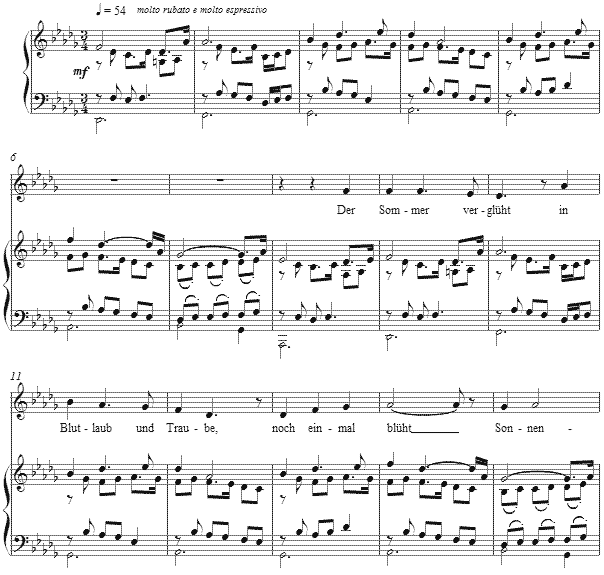Music and Texts of GARY BACHLUND
Vocal Music | Piano | Organ | Chamber Music | Orchestral | Articles and Commentary | Poems and Stories | Miscellany | FAQs
Ein Herbstlied - (2009)
Francisca Stoecklin
for medium or high voice and piano
meiner Frau gewidmet
Der Sommer verglüht
in Blutlaub und Traube.
Noch einmal blüht
Sonnenglaube.
Fühle, o liebe,
Mensch, Tier und Baum!
Daß alles bliebe,
seufzt es im Traum.
Noch flötet Pan
zur uralten Feier.
Einsamer Schwan
im kühlen Weiher.
Gleitet und gleitet,
sein schimmerndes Gefieder,
jetzt rosig entbreitet.
- Kommt Leda wieder -?
Fühle, o liebe,
Mensch, Tier und Baum!
Daß alles bliebe,
seufzt es im Traum.[ 3 pages, circa 3' 30" ]
Francisca Stoecklin
Summer fades
In reddened leaves and grapes.
Yet again blooms
Sun-filled faith.
Feel, yea love,
Man, beast and tree!
That all remains
Sighs in a dream.
Still flutes Pan
In an age old rite.
A single swan
Is in a pond.
Sliding and sliding,
Its shimmering feathers,
Yet hopefully bright.
Comes Leda again? [ 1 ]
Feel, yea love,
Man, beast and tree!
That all remains
Sighs in a dream.
Francisca Stoecklin (1894-1931) was a Swiss poet, painter and lithographer published two volumes of poetry (Gedichte, Bern 1920; Die singende Muschel, Zürich 1925), as well as short stories and prose poems. Born into a middleclass family in Basel, she sought life as an artist and bohemian, traveling with her brother and painter, Niklaus Stoecklin, and a friend, Gertrude Burckhardt to Munich. Returning to Basel for a short-lived marriage, she developed heart disease and died there.
The poem's form is A-B-C-D-B, the final repetition highlighting the notion of "life is a dream," so sweet a conclusion by many poets. The texture of the accompaniment is a four-part chorale, with inner moving voices. The form of this setting adopts the poet's repetition, and further repeats at the end Stoecklin's first verse to end with the image of summer sunshine -- and my view of it as a "sun-filled faith."
The score is available as a free PDF download, though any major commercial performance or recording of the work is prohibited without prior arrangement with the composer. Click on the graphic below for this piano-vocal score.
NOTES
[ 1 ] Leda and the swan are a motifs taken from Greek mythology, in which Zeus came to Leda in the form of a swan. Whether a rape or seduction (because versions of the story disagree) the tale speaks to fecundity in life as a parallel to autumn's fullness.

